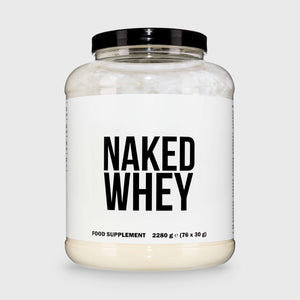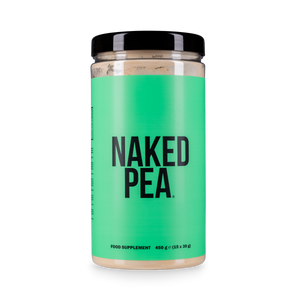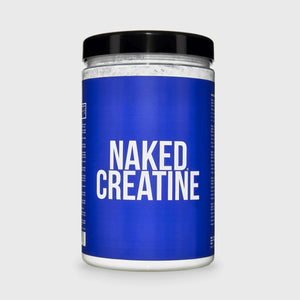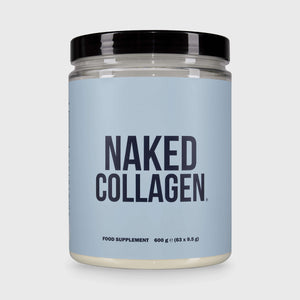The bottom line: Current research shows no significant health advantages of organic whey protein over conventional forms. Both types provide identical muscle-building, metabolic, and recovery benefits that make whey protein valuable for health and performance [1, 2].
**Disclaimer: This article is for informational purposes only and does not constitute medical or nutritional advice. Always consult a qualified healthcare provider or registered dietitian before making changes to your supplement or protein intake.
What Actually Determines Whey Protein Quality?

Many people wonder whether spending extra on organic certification translates to better health outcomes. Let's take a look at what the science tells us about whey protein sources and quality markers.
All whey protein originates from milk during the cheese-making process. When milk coagulates, it separates into solid curds (which become cheese) and liquid whey. This liquid whey undergoes filtration, concentration, and drying to create the powder you purchase.
Because whey protein comes directly from milk, the health and treatment of dairy cows can influence certain aspects of the final product. This connection forms the basis for organic certification requirements and marketing claims about superior quality.
How Do Organic and Conventional Dairy Operations Actually Differ?

If you've ever wondered about the real differences between organic and conventional dairy farming, the distinctions center around feed sources, housing conditions, and treatment protocols.
Conventional dairy operations typically house cows in controlled feeding environments where they receive grain-based diets. These feeds may contain crops treated with synthetic pesticides, fertilizers, and genetically modified organisms (GMOs).
Farmers can administer growth hormones like recombinant bovine somatotropin (rBST) to increase milk production and antibiotics to prevent disease in higher-density housing conditions.
Organic dairy farming requires cows to have pasture access for at least 120 days per year, grazing on grass without synthetic pesticides or fertilizers. Organic certification prohibits synthetic hormones, preventive antibiotics, and GMO feeds.
Cows generally experience more natural living conditions with greater mobility and outdoor access.
A meta-analysis comparing the nutritional quality of conventional and organic dairy products found that organic dairy products contain significantly higher protein, ALA, and total omega-3 fatty acids compared to conventional products.
This can seem confusing when evaluating supplement labels, but understanding these farming differences helps clarify what organic certification actually represents.
What Does Current Research Show About Health Benefits?

Research suggests that whey protein itself provides substantial health benefits regardless of organic status. As a registered dietitian, I frequently recommend whey protein because studies consistently demonstrate its effectiveness for:
Cardiovascular Health Support: Meta-analyses show whey protein supplementation reduces LDL cholesterol by 12-15% and triglycerides by 8-12%, particularly when combined with regular exercise [3, 4].
These effects occur through bioactive peptides that enhance lipid metabolism and improve endothelial function.
Muscle Protein Synthesis Enhancement: Whey protein contains all essential amino acids in optimal ratios, with particularly high leucine content (2.5-3g per 25g serving) that triggers muscle protein synthesis pathways.
Research shows 20-25g post-workout maximizes anabolic response for most adults [3, 4].
Age-Related Muscle Loss Prevention: Studies in elderly populations demonstrate that whey protein supplementation helps maintain lean muscle mass and improves recovery from illness or surgery.
This occurs through enhanced protein utilization and improved amino acid availability during periods of increased need [2].
But here's what's important: Direct comparative studies between organic and conventional whey protein are notably absent from the scientific literature [1].
The health-promoting effects documented in research are attributed to whey protein's inherent properties, not to organic certification status.
|
Health Outcome |
Evidence Quality |
Mechanism |
Applies to Both Types |
|
Muscle protein synthesis |
Strong |
Leucine-triggered mTOR pathway |
Yes |
|
LDL cholesterol reduction |
Strong |
Bioactive peptide activity |
Yes |
|
Sarcopenia prevention |
Strong |
Enhanced amino acid utilization |
Yes |
|
Organic superiority claims |
Weak |
No comparative research |
No evidence |
Why Don't We See Health Differences Between Organic and Conventional Whey?

Many people assume organic whey protein is automatically healthier, but this belief lacks scientific foundation.
Research on products containing organic whey protein highlights their nutritional value and antioxidant activity, but these benefits stem from whey protein's inherent composition, not from organic processing methods [1].
This means both organic and conventional whey proteins deliver the same essential amino acid profile, bioactive compounds like lactoferrin and immunoglobulins, and metabolic benefits that make whey protein valuable for health optimization.
Keep in mind that whey protein's primary health benefits come from its unique amino acid composition, particularly its high biological value (104) and rapid absorption rate.
These characteristics remain consistent regardless of whether the source milk carries organic certification.
How Should You Choose Between Organic and Conventional Whey Protein in 2025?
So, how much does organic certification matter for your health goals? Research suggests your decision should be based on factors beyond direct health outcomes.
If You Prioritize Organic Certification: You may choose organic whey protein for reasons related to environmental sustainability, animal welfare standards, or personal values about farming practices.
These are valid considerations that extend beyond measurable health benefits and align with broader lifestyle choices.
If You Focus Primarily on Health Outcomes: Conventional whey protein provides identical nutritional and performance benefits at typically 30-50% lower cost.
The money saved could be invested in higher-quality whole foods, additional supplements that complement your goals, or other health-supporting interventions.
Quality indicators to evaluate in any whey protein include third-party testing for heavy metals and contaminants, minimal processing methods that preserve bioactive compounds, and manufacturing standards that ensure consistent amino acid profiles.
What Dosage and Timing Optimize Whey Protein Benefits?

Many people wonder about optimal dosing strategies for whey protein supplementation. Research suggests specific timing and amounts maximize the health benefits we've discussed.
For muscle protein synthesis: 20-25g of whey protein consumed within 2 hours post-exercise optimizes anabolic response for most adults. For a 150-pound person, this equals approximately 0.25-0.30g per pound of body weight per serving [3, 4].
For cardiovascular benefits: Studies showing LDL cholesterol reduction used 25-50g daily, typically divided into 1-2 servings. This can be consumed with meals or as part of post-workout nutrition [3, 4].
For elderly populations: Research supporting sarcopenia prevention used 25-30g daily, often consumed between meals to optimize amino acid availability during periods of lower protein intake [2].
Are There Any Risks or Considerations You Should Know About?
If you've ever experienced digestive discomfort with whey protein, this can occur with both organic and conventional forms.
Lactose-sensitive individuals may benefit from whey protein isolate (which contains less than 1% lactose) rather than concentrate forms, regardless of organic status.
Individual factors that matter more than organic certification include:
-
Your total daily protein needs based on activity level and goals
-
Timing of consumption relative to exercise or meals
-
Your budget and access to high-quality whole food protein sources
-
Any food sensitivities or digestive considerations
When to consult a professional: If you have kidney disease, liver conditions, or take medications that affect protein metabolism, work with a registered dietitian or healthcare provider to determine appropriate whey protein dosing and timing for your individual situation.
Best For Different Health Goals in 2025

Understanding who benefits most from whey protein supplementation helps optimize your nutrition strategy:
Ideal for active adults: Those engaged in regular resistance training or endurance exercise who want to maximize recovery and muscle protein synthesis. Whey protein's rapid absorption makes it particularly valuable in the post-workout window.
Perfect for older adults: Individuals over 65 who may struggle to meet protein needs through whole foods alone. Whey protein provides easily absorbed amino acids that support muscle maintenance during aging.
Great for busy professionals: People with demanding schedules who need convenient, high-quality protein sources that don't require meal preparation or refrigeration.
The Bottom Line for 2025
Current scientific evidence does not support claims that organic whey protein provides superior health benefits compared to conventional forms. Both deliver identical muscle-building, cardiovascular, and metabolic advantages through the same biological mechanisms.
What matters most for your health outcomes:
-
Consistent daily protein intake meeting your individual needs
-
Proper timing relative to exercise and meals
-
Overall diet quality and lifestyle factors
-
Budget allocation across your entire nutrition strategy
Your choice between organic and conventional whey protein should be based on personal values regarding farming practices, environmental impact, and cost considerations rather than expected health advantages.
“As a Registered Dietitian, I see the benefit in organic food practices, but as a consumer, it’s hard to distinguish when this is ideal and when it may be working against your budget.”
Focus on finding a high-quality product that you'll use consistently, regardless of organic certification status.
Remember: The most effective whey protein is the one that fits your budget, tastes good enough for regular consumption, and aligns with your broader health and nutrition goals.
Consider working with a registered dietitian to determine how whey protein supplementation fits into your individual nutrition plan.
References:
[1] Szydłowska, A., et al. (2020). Development of Functional High-Protein Organic Bars with the Addition of Whey Protein Concentrate and Bioactive Ingredients. Agriculture, 10, 390.
[2] Camargo, L., et al. (2020). Whey protein ingestion in elderly diet and the association with physical, performance and clinical outcomes. Experimental Gerontology, 137.
[3] Zhao, C., et al. (2021). Whey proteins and peptides in health-promoting functions. International Dairy Journal.
[4] Prokopidis, K., et al. (2024). The effects of whey protein supplementation on indices of cardiometabolic health: A systematic review and meta-analysis of randomized controlled trials. Clinical Nutrition, 44, 109-121.






